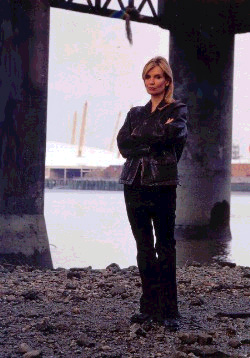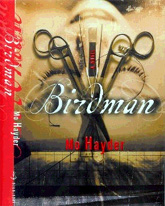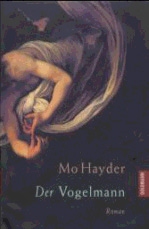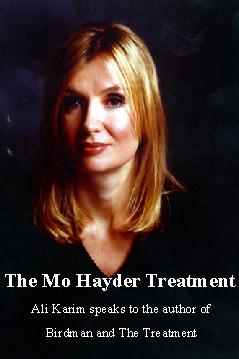Mo Hayder sprang onto the literary scene in 1999 after a fierce
bidding war over her debut novel Birdman. The debut caused a stir of
controversy due to the graphic violence contained within the
confines of a police procedural, all played out against the backdrop
of a pre-millennium South London. The flames of controversy were
further fuelled by the fact that Mo Hayder was female, as were the
victims of 'The Birdman'.
The book would never have taken the publishing world by storm if
her writing was not so skillfully crafted. The novel is a
fear-filled odyssey deep into the underbelly of a civilised society,
revealing that we are only a veneer away from brutality and madness.
The story revolves around the hunt for the serial killer led by the
driven detective Jack Caffery - a man seeking closure from the
trauma of losing his brother Ewan, during a troubled childhood.
Caffery seeks to find 'The Birdman' almost as if in so doing, he can
find peace within himself. Tortured and broken, he functions in
world he has come to accept but not like. He remains deeply haunted
by the figure of Penderecki, a known paedophile who may or may not
be responsible for the disappearance of his brother. Penderecki's
shadow provides a counterpoint to Caffery's struggle which remains
current as he taunts the detective from his side of a railway line
that cuts across their houses. Add a possessive and clingy
girlfriend, Veronica, as well as heightened police politics due to
the fevered hunt for 'The Birdman', and you get a book that sticks
to the fingers as well as clinging to the mind long after the story
has ended.
Hayder followed up her debut with an even more grueling odyssey -
The Treatment - featuring a missing child, paedophilia and an
increasingly weather-beaten Jack Caffery. The horrors in this book
were even more pervasive than those of its predecessor, making me
question why I was reading such a grim novel. The reason I stuck
with it was rather simple - I could not put it down, despite its
darkness.
Hayder's pacing is like a Japanese bullet train that does not stop
on its journey to the centre of the mystery, with a poetic
resolution. Caffery does find the closure that he seeks, but he has
to pay a very high price for the journey.
 Around
the time that The Treatment was unleashed (a Hayder novel can never
be merely released) we were still reeling from the knowledge that
our children were not safe in our society, especially after the
revelations of Cromwell Road and the tragedy of Sarah Payne. Tabloid
hysteria further fanned the flames that roared around these cases,
but they also revealed a society that had either ignored or failed
to acknowledge the veneer that divides us from the evil and madness
lurking beneath. Around
the time that The Treatment was unleashed (a Hayder novel can never
be merely released) we were still reeling from the knowledge that
our children were not safe in our society, especially after the
revelations of Cromwell Road and the tragedy of Sarah Payne. Tabloid
hysteria further fanned the flames that roared around these cases,
but they also revealed a society that had either ignored or failed
to acknowledge the veneer that divides us from the evil and madness
lurking beneath.
I had the pleasure of asking some of the questions that Mo Hayder's
two books had left echoing in my mind, and I hope you enjoy her
answers. Whenever I walk on a sunny street, I am always haunted by
what my imagination conjures about the dark dungeons of the insane.
Her books take you to those dungeons and give you a peek into
madness. Once started, they will be impossible to put down as you
enter the world of Jack Caffery and his own demons. I consider Mo
Hayder's novels deeply therapeutic in trying to understand the evil
and madness that co-exists within our society. They are therefore a
form of Treatment.
Can you tell me about the genesis of your character Jack Caffery
in Birdman and The Treatment?
I think he's made up from a little bit my partner Keith (at his
worst), and a little bit my fevered thirty year old imagination
about a sexy guy. I also wanted him to be flawed, and I trace this
to an incident that happened when I was about 12. The policeman who
lived in the house backing on to ours killed his wife and buried her
in the back garden. I'd been looking at the tent he'd put up to
conceal the grave for about a week before he was arrested in the
middle of the night. I was a very straightforward little girl with
unimaginative morals and I couldn't believe one of the 'good guys'
could behave like that. It made me think about the common ground
that all of us inhabit, whatever side of the law we think we're on.
I enjoyed, if that is the right word, the realistic strain
between Jack and Veronica in Birdman, especially the way the doomed
relationship added to the claustrophobia within the book.
Yes. Poor Veronica is so desperate for her man, she'll do anything.
Anything. She's not really a bitch, she's just fighting a losing
battle for someone she thinks she loves, and there's nothing sadder
than that.
Can you tell me something about Penderecki's backstory?
I lived on a railway line in South London and was fascinated by the
houses that backed on to it on the other side. One night I thought
'imagine if someone in one of those houses had done something
terrible to you' - you'd never forget, never. As long as you had
those houses facing you, you'd be trapped in the memory. Caffery's
brother disappeared when they were children and he's fairly certain
that Penderecki abducted him, but his body has never been found. And
so Caffery is trapped in his memory.
 The
sub-plot in Birdman involving Caffery and Penderecki, Caffrey's
missing brother Ewan and the subsequent disintegration of his family
appeared fully realised, but was not concluded satisfactorily until
The Treatment. Did you feel any pressure from within, or from your
publishers, to resolve the thread - or was the story always a
two-book deal? The
sub-plot in Birdman involving Caffery and Penderecki, Caffrey's
missing brother Ewan and the subsequent disintegration of his family
appeared fully realised, but was not concluded satisfactorily until
The Treatment. Did you feel any pressure from within, or from your
publishers, to resolve the thread - or was the story always a
two-book deal?
It was always a two book deal. I was quite clear that I had two
Caffery books in me and told the publishers this at the outset. This
isn't to say that half-way through The Treatment I didn't change my
mind. I had a terrible few months where I did want to go on with the
same characters. My publishers, Transworld, were enormously patient,
even when I delivered late (to put it mildly).
Had you written anything before Birdman? It really doesn't read
like a debut novel.
That is very generous. There is a lot about it I would
change. But actually it truly is the first thing I wrote, with the
exception of a couple of short stories for a writers course. Birdman
features little touches that tugged at the emotion, such as
Caffery's blackened fingernail from Ewan/the treehouse. Where did
these touches come from?
Ah - they come from the bottom of a bottle if I'm honest. They come
from the late night drunken musings one occasionally has if one is
lucky. I don't know anyone with a bruised fingernail so maybe you
can properly call that idea a donnd What made you write Birdman -
and can you tell us how you got it accepted? It was the classic rags
to riches story - the sort of thing that young would-be-writers are
told never happens. Birdman went into a bidding war, and from there
it just spiralled. One minute I was doing a minimum wage job,
scribbling away on my first novel, the next I was flying first class
around the world getting excited phone calls from my agent about the
latest major deal. It was a real head turner. I'm still horrifically
warped by the experience.
How did you feel when Birdman was released with the comparison
to Thomas Harris?
Mmmm - ambivalent. I thought it was a good way of telling the
reader the sort of book they were picking up but I was uncomfortable
with the suggestion that on my first novel I could compare to
someone with that track record.
You have cited James Ellroy as an influence. Can you name any
other writers as influences?
Actually the list is endless, everyone influences me in some way or
another, but briefly: Patricia Highsmith, Val McDermid, John Updike,
and believe it or not Mishima, the great suicide story.
You spent some of your teenage youth in the music scene in
London, care to comment?
It was great - just after punk and Soho was full of venues and
music pubs and you could wander down Wardour Street and bump into a
Sex Pistol or two. It was also mad, lots of cliched sex and drugs. I
was nuts about clothes - I'd have done anything, sold my own mother
for a Swanky Modes dress.
Can you tell us about your life in Japan and what you learned
while working in the Far East?
I had a friend in London who was murdered in a horrific,
ritualistic attack. Looking back at the injuries he received, with
what I know now about forensic psychology, I realise that he was
probably killed by someone he knew. Quite soon after that a friend
was attacked in Tokyo, and the shock for me was how random it was -
she simply hadn't changed the locks on the house she was renting. My
life in Japan was pretty weird actually - I was working in a hostess
club, earning an absolute fortune, and living alone in a huge dusty
traditional Japanese house that was slated for demolition. It's all
going in to novel number three which is the story of a British girl
working in a hostess club who gets involved with the Japanese mafia
(with terrible consequences).
When I read The Treatment, I commented to my wife that I was
unsure why I was reading something so unrelentingly grim, but I
couldn't put it down due to the strength of your prose. I read it in
one sitting (like Birdman). Can you tell us what is what like
writing such a dark book? How did it effect your own life?
Thank you so much. The research I did for both the books was
horrific, but once I'd parcelled it all up and converted it into a
story I found that my lifelong nightmares of violence actually
stopped.
 The
climax of The Treatment almost reduced me to tears - the catharsis
is as brilliant as the resolution is poetic and melancholic. Did you
waver at what to do vis-à-vis the Ewan issue? Or is the
ending how you imagined it always? It's exactly how I wanted it
to be. Some people have disliked the ending, maybe because they
would have liked a more conventional tying up, but I always knew,
even before I finished Birdman, how it would end. It felt right.
Some people say that the ending makes the book linger with them
afterwards, and if that's what I've achieved then I'm happy. The
climax of The Treatment almost reduced me to tears - the catharsis
is as brilliant as the resolution is poetic and melancholic. Did you
waver at what to do vis-à-vis the Ewan issue? Or is the
ending how you imagined it always? It's exactly how I wanted it
to be. Some people have disliked the ending, maybe because they
would have liked a more conventional tying up, but I always knew,
even before I finished Birdman, how it would end. It felt right.
Some people say that the ending makes the book linger with them
afterwards, and if that's what I've achieved then I'm happy.
When The Treatment was released, were you concerned at the
series of paedophile cases emblazoned by the tabloids?
I was half way through writing when little Sarah Payne went missing
and for about two weeks I simply couldn't write any more - the
parallels to the story in The Treatment were so eerie. I had to
force myself to start again. And yes, if I'm honest, I was nervous
when publication date rolled around. But the reaction has been very
positive. I suppose it's not what you write about but how you write
it that counts.
The hardcover design for The Treatment is stunning. Did you get
involved at all in the cover design?
No - except saying that I liked the idea of a thriller in a white
cover. The horrible little rats are down to Clare, a superbly
talented lunatic in the art department.
When you write, do you play music, or do you work in silence?
Sometimes I play music, but I can't listen to anything with lyrics;
I tune into the words and get distracted. I can't even hear the tune
of a song I know well because I get dragged off on the words I know
are there. I've started listening to German music, stuff by Brecht,
which sounds very highbrow but it's just so I don't understand the
words. The only constant in my working habits is that I sit in bed
using a laptop. I'm sure there's a joke in there somewhere.
Who/What are you reading at the moment?
I'm struggling with Underworld, (Don DeLilo) and treating myself to
chapters of Paris Trout (Pete Dexter) for when I've been good.
Congratulations on becoming a mother. Has that affected your
writing process - both from a practical as well as a psychological
point of view?
Thank you so much. It's the most wonderful thing I've ever done.
Practically, it's made me much more jealous of my time. If I have
the time to write I grab it and I'm not so scared of writing without
sleep. Psychologically - well I could write pages about how it's
changed me for the best, but the jury's out on whether it's seeped
into my writing yet.
Can you tell us about your life in Japan and what you learned
while working in the Far East?
I had a friend in London who was murdered in a horrific,
ritualistic attack. Looking back at the injuries he received, with
what I know now about forensic psychology, I realise that he was
probably killed by someone he knew. Quite soon after that a friend
was attacked in Tokyo, and the shock for me was how random it was -
she simply hadn't changed the locks on the house she was renting. My
life in Japan was pretty weird actually - I was working in a hostess
club, earning an absolute fortune, and living alone in a huge dusty
traditional Japanese house that was slated for demolition. It's all
going in to novel number three which is the story of a British girl
working in a hostess club who gets involved with the Japanese mafia
(with terrible consequences). I know it's a wonderful setting for a
thriller. I'm also interested in Japan's role in the Pacific war -
some of the atrocities committed there were far worse than any a
horror/thriller writer could invent. The book is the account of a
woman's experiences in a hostess club and the events surrounding the
disappearance of her friend.

Can you give us even an approximate date for when we are
likely to see this secret project?
Um……. I think I'm going to pass on this one!
Thank you for your time speaking with SHOTS and we wish you
success in your next venture!
Thanks!
Birdman is available as a Bantam/Transworld
paperback.
The Treatment is available as a Bantam/Transworld hardback and due
for paperback release in June 2002.
SHOTS would like to thank Mo Hayder and Prue Jefferys of Transworld
Publishers for their time.

|

